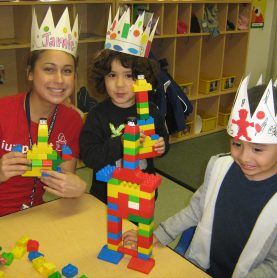In 1992, Neurons to Neighborhoods was published laying out the scientific research that concluded the first five years of life were the most important years in every individual’s development. Over the next 20 years, investments in the first five years of life became the top priority for early educators. In California, Proposition 10 funded First 5 Commissions and investment in early childhood increased significantly. California’s state budget investment in young children grew to a remarkable $3.2 billion but was then reduced to $1.8 billion during the recession. As the economy recovered, funds were returned to the system mostly in the form of increased investment in state preschool. And, just recently, there was also an increase in Federal funding for preschool.
James Heckman, who received The Sveriges Riksbank Prize in Economic Sciences in Memory of Alfred Nobel 2000, has developed a continuum that shows there is a significant return on early investments for disadvantaged children and families. He relates that, while there is a healthy return for investments made beginning with the preschool years, there is an even larger return on investment for programs that intervene in the earliest years: infants and toddlers. Yet with all of the research that exists supporting early intervention and brain development, there remains a distinct lack of quality infant and toddler programs while the investment continues to grow for preschool programs.
The Los Angeles Times recently published a piece describing Transitional Kindergarten or TK (August 31, 2015). TK has been expanded so that any school district can now provide a program to any four-year old, not just those who missed the new September cutoff for Kindergarten. The article claimed that the program, offered to low income families, has significant advantages over other preschool programs that makes TK a better choice than other forms of preschool. Specific advantages, according to the article, include that TK teachers have a credential in Elementary Education and that the program is “full day” where state preschool and Head Start are part day programs.
However, there are several points either left out or misinterpreted that need clarification:
1. Claim: Certificated Elementary Education Teachers are better teachers than teachers with a Children’s Center permit.
Clarification: A certificated teacher takes a one year program after receiving a bachelor’s degree in any subject. The one year certificate is focused on addressing children who are five years and up. There is very little if any attention paid to the physical, cognitive or social emotional development of preschool aged children. A Children’s Center permit is focused on addressing the specific needs of the young child. In Head Start most teachers have a bachelor’s degree in Early Childhood Development which requires a focus on the total needs of the young child not just their cognitive needs.
2. Claim: TK is comparable to other preschool programs.
Clarification: The TK ratio of adults to children can be as high as 25 to 1 teacher and an aide. That computes to a ratio of 1 adult to every 12.5 children. The TK ratio is higher than allowed by State Licensing and is higher than the recommended ratios of the National Association for the Education of Young Children and the National Head Start Association which advocates for a maximum ratio of 10 children to 1 adult. The ideal ratio as recommended by the National Resource Center for Health and Safety in Child Care and Early Education is 8.5 children per adult.
3. Claim: TK is a full day public school program
Clarification: The school day is usually 6.5 hours per day and doesn’t address a parent who generally works an 8 hour day plus needs time for commuting. The public school year does not address the short days that most schools have weekly, the long breaks at various times during the school year or the entire summer.
4. Claim: Head Start is just another half day preschool.
Clarification: Head Start is another program that is greatly misunderstood. For the last 50 years, it has provided a preschool program for extremely low income four-year olds but it is so much more than that. While there is an instructional component, children also receive medical and dental services. A mandated 10% of those served have a disability. Mental Health services are provided. Parents are involved in all decision making and review all decisions including budgeting and personnel.
Nationally, more than half of Head Start teachers have degrees in child development and in Los Angeles almost all of the teachers have child development degrees. The ratio of adults to children is kept around 1 adult for every 8 children. School readiness is the focus and children can be enrolled at age three allowing for two years of age appropriate instruction.
Major changes to Head Start through the 2007 reauthorization have strengthened Head Start’s standards, teachers, and curricula. Local efforts to track children’s outcomes have found strong school readiness outcomes and sustained impacts. And in California more than 70% of the Head Start programs combine with state preschool funds to offer a full day that is comparable to TK.
So before enrolling your child in TK, parents should consider these questions:
- Is your child ready for a formal school experience at age four? Will your child be sitting for long periods of time at a desk?
- Will TK serve your needs if you are a working parent? What will you do when school is not in session: summers, holiday weeks, early dismissal days?
- How will you deal with afterschool care? Will the afterschool program at the school be appropriate for your four-year old?
- Will there be opportunities for your child to learn through play? Will there be opportunities for your child to move around and experience activities in small groups and individual activities?
- How will TK engage you as a partner in your child’s learning?
- How many adults are regularly present in the classroom? How many children will there be in the classroom? Will your child be safe?
While TK appears to be the solution to parents’ preschool dilemma, when typically developing four-year olds are expelled because the program they are in isn’t developmentally appropriate, TK won’t seem that way.
If you have any questions or comments, we want to hear from you, contact us at 1-866-67-4KIDS!


